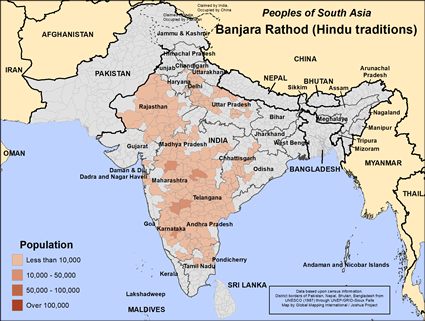The Hindu Banjara, who are known by 53 different names, primarily speak Lambadi or Lamani and Banjara.
They are the largest nomadic group in India and are known as the root Romani of the earth. The Romani began traveling from India to different regions of Europe hundreds of years ago, and differing dialects evolved in the regions in which each group settled. The Banjara's name is derived from the word bajika, which means trade or business, and from banji, meaning peddlers pack. Many consider them descended from Jews who were exiled to Egypt, as they came to India from Egypt and Persia. Some believe they were expelled from their homeland by Muslim invaders. They are now located in over fifty percent of the districts of India.
Although we usually associate Banjara groups with bands of fortune tellers traveling in colorful caravans from place to place, this is no longer the case. Historically they were nomadic and kept cattle, traded salt and transported goods. Now, most of them have settled down to farming and raising cattle or grain. Others still trade in salt and other commodities. In some regions, a few hold white collar positions or work as government servants. They also sew intricately embroidered colorful clothes with shining discs and beads. They make ornaments and ornate jewelry, which the women also wear.
Not only do the Banjara Rathod usually have more than one occupation, they also use additional skills to supplement their incomes, depending on the societies needs at the time. Some specialize in making items such as broomsticks, iron tools and needles. They may also repair tools or work with stone. Others believe that one does not have to work for a living and gain income by "religious begging." They sing and wear special make-up while begging in the name of a specific deity. The Bhanjra Banjara love music, playing folk instruments and dancing. The Bhanjra Banjar are also acrobats, magicians, tricksters, story-tellers, and fortune-tellers.
Because they are poor, they eat what they have grown in their gardens along with dairy products. Many live in grass huts, often with extended families. Banjara Rathod families are closely knit, having minimal relationships with other castes. The role of leader of the community is passed down to the leader's son. All biological sons get an equal share from parental property. Marriages may be arranged, especially to avoid the union of relatives to three generations back. In some groups, however, cousins are allowed to marry. Married women wear ivory armbands.
The majority of Banjara Rathod are Hindu; some have combined Hindu practices with their own animistic beliefs. Other groups follow Islam; yet others are Sikh. Romani often follow folk beliefs and mixed with these religious beliefs are many taboos (things one must never do.) One Hindu taboo is that a woman's hair must not be combed or let down long in the presence of men. Another is that a woman should not pass in front of a man who is sitting, but rather behind him. Even though Romani are unreserved in speech, many have high moral standards. For example, chastity is very important. In the past, some girls who were involved in prostitution were buried alive. Unmarried girls are still discouraged from going into the cities, and they usually wear veils over their hands and feet while sitting with strangers.
Many Banjara Rathod live in poverty. Often the only clothes they own are on their backs. An unsanitary lifestyle has created many physical needs among them.
Most children do not attend schools because their families are always on the move. The Banjara do not have a written language, so depending on whatever state of India they are in, if they read, it must be in that states' script.
Pray for the Bhanjra Banjar to understand and respond to Christ.
Pray God will have mercy on the Bhanjra Banjar doing whatever it takes to place them in a position to receive him.
Ask God to open the hearts of the Bhanjra Banjar to the gospel.
Pray for an unstoppable movement to Christ among them.
Scripture Prayers for the Banjara Rathod (Hindu traditions) in India.
| Profile Source: Joshua Project |











